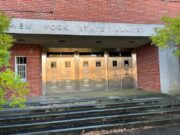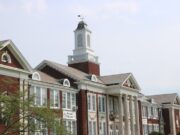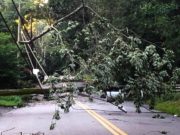Riverhead school faculty, parents and administrators are split on whether the Board of Education should change the policy that weighs a high school student’s state Regents examination score as a fifth of their final course average.
Some parents and school board members have been pushing for the district to institute a permanent “Do No Harm” policy, which would only weigh Regents exam results if the score improves that student’s grade. The current policy weighs a student’s Regents exam score in required courses as 20% of their final course average, although the policy was temporarily suspended and replaced with the “Do No Harm” policy during the last two school years.
Advocates of the policy argue that the Regents exams, which students are required to pass to earn their diploma, should not be able to harm a student’s grade point average for a course. The performance of a student on one lengthy test, which a student could perform poorly on due to factors outside of the classroom, should not count the same as a quarter of the school year, they said.
But some Riverhead teachers say “Do No Harm” is a misnomer. The policy would actually harm certain students, disrupting the class ranking system currently in place and decreasing the importance of the exams, they said.
The conversations surrounding changing the policy have been, for the past year, discussed behind closed doors in a committee. But all that changed earlier this month when the co-president of the school district’s administrator’s union and the district’s director of guidance, Charles Gassar, used the union’s time to speak in favor of a “Do No Harm” policy.
“I would like you all to be aware that every secondary-level guidance counselor — middle school and high school — as well as every secondary level building administrator — middle school and high school — unanimously support maintaining a ‘no harm’ policy,” Gassar said.
The Riverhead Board of Education, following the actions of several other district’s on Long Island, temporarily suspended its policy for weighing the Regents exam in course averages in the 2020-21 school year, citing the “inequities in the educational opportunities provided to students” because of the COVID-19 pandemic. On the state level, the Board of Regents enacted a “special appeal” that allowed students who got under the passing score of 65, but over the score of 50, to apply for their score to count as a passing grade if they had a passing grade on the rest of the course.
The board continued to temporarily suspend the exam weighting policy in the 2021-22 and 2022-23 school years, but amended the suspension to allow exams that improve a student’s grade to count towards a student’s course average.
With the second half of the 2023-24 school year beginning, and the pandemic and its restrictions on in-person learning in the past, the school board must make a decision on whether it wants to touch the policy again. Does it want to leave the 20% weighting in place? Temporarily suspend the policy as it has the last few years? Or choose to permanently amend the policy — an option which itself presents several branching paths?
Public comments by trustee Virginia Healy and former trustee Christopher Dorr last January prompted the creation of a committee of parents, faculty and students to discuss whether the district should change the policy.
That committee ended up being divided on the issue, Assistant Superintendent William Galati, who moderated the group, said in an interview. The committee’s results will be shared with the Board of Education’s policy committee, which will discuss the subject and recommend to the rest of the board whether or not to change the policy.
“I don’t think that a test that’s written by people in Albany should equate to 10 weeks of magic that happens in that high school building,” Kathy Maciora of Aquebogue, one of the three parents on the committee, said in an interview.
College admissions and scholarships are extremely competitive, said Maciora, a mother of three whose youngest son is a sophomore at the high school. A score on a regents exam that lowers a student’s GPA could cost them to lose an important opportunity, she said.
Students will still take the exam seriously, because passing the exams are required for students to get their diploma, Maciora said. To graduate, a student must pass five Regents exams, one in English, one in math, one in science, one in social studies, and one additional exam of their choice. A student can pass additional exams to earn an Advanced Regents Diploma.
“I think it has an intrinsic value to kids that has nothing whatsoever to do with how the exams are graded,” Maciora said. “I think that probably 80% of the kids in the district don’t even know that we weigh the Regents exam, and they still show up and still try and do well on it.”
Gassar said Regents exams are not a large factor in college admissions, since New York State is the only state in the country that has them.
Both Gassar and Maciora back up their argument by noting that the New York State Department of Education is against the use of the exams as a part of final course grades. In an August 2022 document published by NYSED, the department states it discourages the use of the exams as a part of final course grades because the scores “are scaled scores and not percentage scores typically used for course averages.”
However, other information published by NYSED is not as clear on the issue. The graduation requirement page on NYSED’s website states the department “does not require nor recommend the inclusion of Regents exam scores in the computation of final course averages,” and acknowledge grading policies are determined by local school districts. NYSED’s assessment office did not immediately return a call requesting a clarification of NYSED’s opinion.
Maciora also points to the Board of Regents reevaluation of its graduation criteria to support her case. A Board of Regents blue ribbon commission on student graduation measures reported late last year that it recommends revising the system to receive a diploma. Possible changes, the report says, could include reducing or modifying assessment requirements; creating “performance-based” assessments to satisfy requirements; providing exemptions from diploma assessment requirements for students with “significant cognitive disabilities and major life events and extenuating circumstances”; and creating tailored graduation requirements for people with unique circumstances.
But other members of the ad hoc committee think the district should continue weighing the exam. In an interview, three Riverhead High School teachers on the committee argued that a “Do No Harm” policy would negatively impact students in several ways.
“There’s a genuine lack of equity in the process if you don’t count the tests the same for every student,” English teacher Laural Olsen said of grading with a “Do No Harm” policy in place.
Riverhead Central Faculty Association president Greg Wallace said in an interview that “If they were to move forward with a no-harm policy, class rank should be eliminated, because you’re not comparing [equal] measures.”
But Gassar, the director of guidance, said students haven’t complained about the “Do No Harm” policy the last three school years. “It can help a student, it can harm a student, the same way we have it now,” Gassar said of the current weighting policy.
The teachers said there are proper safeguards in place to make sure students’ grades are accurately reflected in their exam performance. There are emergency waivers. Galati said teachers offer extra help and Regents exam review classes to their students, as well as academic intervention services for students struggling. “We do have the support structures in place,” he said.
The policy that would be amended, 4711, already has a “Do No Harm” policy for its most vulnerable students, the teachers said. Students with disabilities and English language learners can receive credit towards a local diploma with a Regents exam score below 65, and Regents exam scores that would cause a student in either of those groups to fail their course would not be counted.
The exemption built into the current policy affects more than 30% of the district’s students, math teacher Evan Philcox said.
Because of those exemptions, “A lot of the conversation in the committee was about the ‘Do No Harm’ policy and its impact on our upper end students and how it could potentially impact a student’s class ranking and or scholarship opportunities with one bad performance on the test,” Philcox said.
“Are all these things real about, you know, one bad day or somebody’s sick? Of course. Life happens,” Philcox said. “But on the balance, it’s not harming students. And it would be harmful to the upper end students now when you start shifting those things around.”
The teachers also argued that students need to be able to take tests in their future education or careers, and the necessity of students be held accountable for their scores.
“By removing opportunities for students, or anybody to overcome adversity, you’re doing harm to that person, because you’re not given the opportunity to overcome that and feel good about themselves and build resilience and build grit, and build a sense of accomplishment and have, ‘Oh, wow, that was hard but we did it. We overcame it,’” Philcox said. “That is even more important, really, than GPA, when you think about it, after the K through 12 years are over. That sort of character piece is going to really stick with them.”
Because of those reasons, the committee almost immediately rejected changing the policy to the “Do No Harm” Maciora and others are advocating for, according to the teachers and Galati. The focus of the committee’s work shifted from whether the Regents should be weighted to how much it should be weighed.
“Counting the Regents at 20%, we’re in the minority; there’s very few districts that do that anymore. There’s more and more districts that don’t count it at all,” Maciora said. “But even the ones that do count it are moving away from that 20%.”
The committee discussed how grades would be impacted if the weight of the Regents exam was decreased or if it were increased. Philcox said his analysis showed that reducing the weight of the exam to 10% would be disadvantageous for a fair number of students, who he said depend on the Regents exam to boost their class average.
Data that the teachers said the committee discussed during its meetings was not made available to RiverheadLOCAL. District officials cited the Family Educational Rights and Privacy Act, a federal records access law, when rejecting a reporter’s request for the data.
At the end of the process, a vote of the committee was taken with a secret ballot, committee members said. Four members of the committee — a plurality of the group — recommended the policy stay as is, while three members favored reducing the weight to 10%, Galati said. Other members of the group suggested other numbers, which Galati and the teachers did not specify.
But the results of the committee’s vote are in dispute.
Maciora and Gassar said the voting system was confusing. Gassar said he and the other administrators on the committee “didn’t quite understand what we were voting on.” He said the ballot blended together the issues of whether to have a “Do No Harm” policy and how much weight the Regents exams should be given, rather than having them as two separate issues.
Galati and the teachers said there was no vote on a “Do No Harm” policy, and that the vote was for determining how much Regents exams should be weighted.
Gassar said the confusing voting process and its results was one of the reasons why he spoke publicly to the school board about the issue.
Maciora said the deck was stacked against the “Do No Harm” supporters on the committee. She said there were only three parents on the committee (originally only two were invited) and that her request to send out a poll to parents about the policy was rejected by Galati.
Both Maciora and Gassar said in separate interviews that the students on the committee were not a diverse representation of the student body. The group also did not have representation from the guidance department until Gassar joined it at the second-to-last meeting, at the recommendation of Interim Superintendent Cheryl Pedisich.
Maciora said weighing the Regents at 10% would be a positive move, but a small step overall. “I expect more of this district. I expect more of our board of ed, and I expect more of our administrators and our teachers,” Maciora said. “And I feel that we need to have a level playing field with so many other districts that have adopted a ‘Do No Harm’ policy.”
Standardized testing has long been an issue in Riverhead and across Long Island. For the last decade, local students and parents have embraced the national opt-out movement, which caused a large number of students to boycott standardized testing for grades 3 through 8. The “Do No Harm” policy has been advocated by those same parents against standardized testing.
“Bottom line, this is a complex issue with no correct answer,” Wallace, the teacher’s union president, said in a message to a reporter. “Much of the anger and animosity toward testing is an outgrowth of the unilateral implementation and expedited roll out of the Common Core and federal testing mandates. These mandates were thrust upon schools and communities with little or no input from the various stakeholders.”
Wallace also criticized Gassar’s statement to the Board of Education. “That being said, circumventing the committee process by presenting a singular narrative in an attempt to disenfranchise individuals who hold other views while pursuing a singular agenda is no different,” he said.
Allyson Matwey of Wading River, a parent and advocate of the policy, who years ago tried to change the Regents weighting policy, said she is hopeful that the last three years of the policy triggered by the pandemic proved the change is good.
“I think we can do a ‘Do No Harm’ policy and still actually have kids try and learn and be engaged and encouraged to participate,” she said. “And I think we have an opportunity as a district to actually be ahead of the curve for once…”
The survival of local journalism depends on your support.
We are a small family-owned operation. You rely on us to stay informed, and we depend on you to make our work possible. Just a few dollars can help us continue to bring this important service to our community.
Support RiverheadLOCAL today.


































